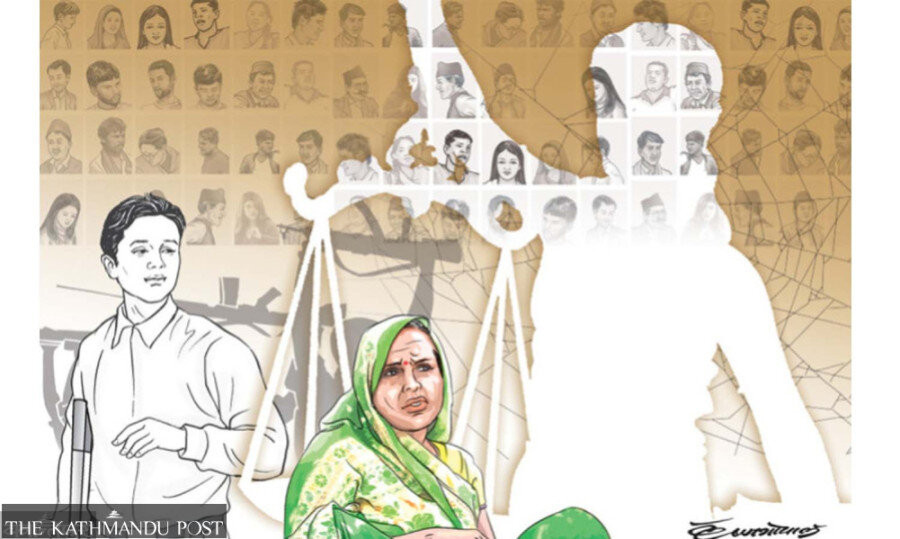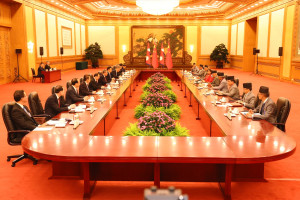National
Office bearers selection committee finalises working procedure
The Om Prakash Mishra-led panel works out procedure for nominating the chairpersons and members for the transitional justice commissions.
Binod Ghimire
The committee to recommend names of office bearers for the two transitional justice commissions has finalised the working procedure provisioning five days for aspirants to apply while also authorising itself to pick candidates directly.
The Om Prakash Mishra-led panel finalised the procedure that sets the course for nominating the chairpersons and members for the Truth and Reconciliation Commission and the Commission of Investigation on Enforced Disappeared Persons.
“We have decided to make public the working procedure tomorrow [Monday], allocating two days for feedback. It will be endorsed on Wednesday, incorporating the feedback if necessary,” Khamma Bahadur Khati, spokesperson for the committee, told the Post.
“We are for making the entire process very transparent and engaging the stakeholders as far as possible.”
As per the working procedure there are three ways to collect the names of candidates. First, the aspirants can apply directly within the deadline, second, different victims’ and human rights organisations can also recommend names, and lastly, the committee itself can pick the probable candidates. Khati, who also is a former attorney general, said the provision of organisational recommendation and selection by the committee itself was included as renowned figures might not be willing to file their candidacy.
As per the recent amendment to the Enforced Disappeared Enquiry, Truth and Reconciliation Commission Act, a person who is qualified to be a Supreme Court justice is eligible to become chairperson of either of the commissions. And those who are eligible to become the members must have qualification to be a high court judge. Each commission will have five members led by a chairperson.
Khati said the committee will publish a shortlist of the candidates with three nominees for each position. “The shortlist will be published after a proper consultation with the experts and stakeholders,” he said.
“While feedback will be invited by making their names public, they will have to present their vision before the committee and a select group of experts and stakeholders. The names will be finalised after proper evaluation of the candidate's background, their expertise and presentation.”
Before finalising the working procedure, the committee interacted with the representatives of around two dozens of victims’ organisations. The victims’ representatives have demanded adoption of a credible and transparent process in the selection, engaging the victims in every step. They have presented 10-point recommendations to be followed by the selection committee.
“We have clearly told the committee that the victims want qualified individuals selected transparently refraining from political sharing like in the past,” Gopal Shah, chairperson of the Conflict Victims National Network, told the Post. “The victims are ready to engage with the committee if it adopts a transparent selection process."
The two commissions have been defunct since July 2022, when the government extended their terms without retaining their chairmen and members. The government claimed the bill to amend the transitional justice law would be endorsed by October 2022, and the appointments would be made based on the revised Act.
However, the federal parliament took over two years to endorse the bill. The victims and human rights defenders are now closely watching who will be appointed to the commissions.
The truth commission has received 63,718 complaints, while the commission on disappearances is sitting on around 2,400 cases. The new teams will have four years to accomplish their tasks, though there are provisions for their extension. The commissions, first formed in 2015, have done little beyond collecting complaints and conducting preliminary investigations on some cases.
The amended Act sets four years’ time for the two transitional commissions to investigate the cases and recommend prosecution and reparation. However, there is a possibility of extension if they fail to accomplish their job.
“The earlier we complete the selection, the faster the commission will start their work. We have set a target to select the candidates before our deadline,” said Khati.
Earlier, on April 12, even before the Act was amended, the former government led by Pushpa Kamal Dahal had constituted a committee under Mishra to nominate the candidates in the two commissions. The committee was formed following a ruling from the Supreme Court. But the committee couldn’t take full shape as the National Human Rights Commission (NHRC) refused to send its representative until the law was revised.
Two months after the Act was amended in August, the incumbent government on October 18 reconstituted the Mishra-led committee, replacing one of its members. While Arjun Karki, a former ambassador, and Stella Tamang, a rights activist, have been repeated in the new committee, Khati, a former attorney general, replaces Jagdish Sharma Poudel, a retired Supreme Court justice.
Commissioner Manoj Dawadi represents the NHRC in the Mishra-led committee. While the government picks four members for the committee, the fifth member is either the NHRC chairperson or someone nominated by him/her. The committee has until December 17 to select the chairpersons and members of the two commissions.




 19.12°C Kathmandu
19.12°C Kathmandu













